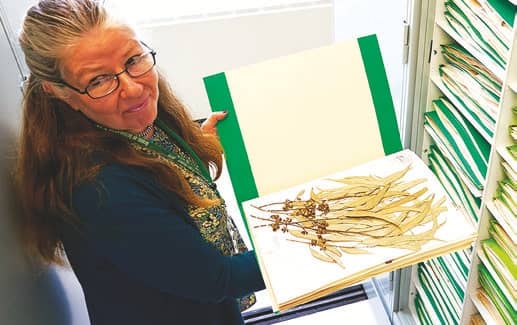Prøve GULL - Gratis
MARIA A. GANDOLFO
Muse Science Magazine for Kids
|March 2020
Animals and insects aren’t the only ones that leave their remains in stone and amber! Meet paleobotanist Maria A. Gandolfo, who studies fossils made from flowering plants. A flowering plant tucks its seeds inside a flower instead of growing them on its leaves. Most of the plants we eat and use as medicine and fuel are flowering plants. Today they flower all over the planet—but that wasn’t always the case. Here Gandolfo explains what plant fossils can tell us and how flowering plants got to be such a big deal.

HOW DO YOU STUDY A PLANT FOSSIL?
Working with plant fossils is an extremely rewarding job! The most interesting thing is to do fieldwork and to collect the fossils. In the field, the fossils are numbered and carefully packed. Once the fossils arrive at the museum, they are catalogued and sometimes cleaned. Then we “describe” the fossils (measure them, assess their shape, note if they have veins) and analyze them. They are compared with modern plants and other fossils that are similar. This way we can figure out their plant ancestors and if there are any modern, related plants that will help us understand their past distribution. When possible, we reconstruct the environment (habitat and climate) in which they lived with the help of geologists and sedimentologists.

WHEN—THAT IS, FROM WHAT TIME IN THE PAST—DO YOU FIND FLOWERING PLANT FOSSILS?
Denne historien er fra March 2020-utgaven av Muse Science Magazine for Kids.
Abonner på Magzter GOLD for å få tilgang til tusenvis av kuraterte premiumhistorier og over 9000 magasiner og aviser.
Allerede abonnent? Logg på
FLERE HISTORIER FRA Muse Science Magazine for Kids

Muse Science Magazine for Kids
ANIMAL FIREFIGHTER TO THE RESCUE
Can animals help manage the risks of deadly wildfires?
3 mins
Muse July 2025: The Story Behind Wildfires

Muse Science Magazine for Kids
FIRE DANGER
WHY THE RISK OF WILDFIRES KEEPS GROWING
4 mins
Muse July 2025: The Story Behind Wildfires

Muse Science Magazine for Kids
The Miller NEW Normal
WHAT TODAY’S WILDFIRES TELL US ABOUT OUR FUTURE
8 mins
Muse July 2025: The Story Behind Wildfires

Muse Science Magazine for Kids
WOMEN AND FIREFIGHTING: A GOOD FIT
Jessica Gardetto is a firefighter. Her father was, too. “I grew up with my dad coming home smelling like wildfire and covered in soot,” she says.
1 min
Muse July 2025: The Story Behind Wildfires

Muse Science Magazine for Kids
What is happening on your fingertips when they get all wrinkly in a hot tub?
—Felix G., age 10, Montana
1 mins
Muse July 2025: The Story Behind Wildfires

Muse Science Magazine for Kids
WHEN the SMOKE CLEARS
THE LINGERING EFFECTS OF THE RECENT PACIFIC PALISADES AND ALTADENA EATON FIRES
6 mins
Muse July 2025: The Story Behind Wildfires

Muse Science Magazine for Kids
PICKING TEAMS
Keep it fair with a strategy that relies on geometry.
2 mins
Muse July 2025: The Story Behind Wildfires

Muse Science Magazine for Kids
SHAN CAMMACK
WILDLIFE BIOLOGIST AND FIRE SAFETY OFFICER
3 mins
Muse July 2025: The Story Behind Wildfires

Muse Science Magazine for Kids
Scientists Create Mice With Woolly Mammoth-Like Fur
RESEARCHERS AT A COMPANY IN TEXAS ARE WORKING TO CREATE A LIVING ANIMAL THAT RESEMBLES THE EXTINCT WOOLLY MAMMOTH. Recently, they produced mice with traits of the large mammal. The mice all have coats with mammoth-like fur, and some of the small mammals also have genes that help them store fat. Both features would help the animals survive in the cold Arctic, where the woolly mammoth once lived.
1 min
Muse July 2025: The Story Behind Wildfires

Muse Science Magazine for Kids
Cool Sunshade Added to the Nancy Roman Space Telescope
THE NANCY ROMAN SPACE TELESCOPE IS A NEW TELESCOPE THAT NASA IS BUILDING AND WILL LAUNCH INTO SPACE, LIKELY IN EARLY 2027.
1 min
Muse July 2025: The Story Behind Wildfires
Translate
Change font size

